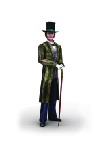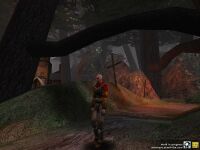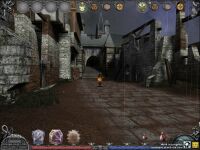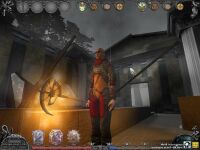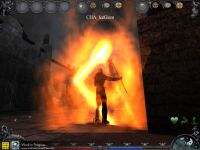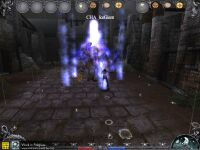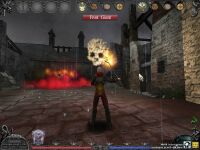|
|
|
Main News Forums Games Games Database Top 100 Release List Support Files Features Reviews Previews Interviews Editorials Diaries Misc Download Gallery Music Screenshots Videos Miscellaneous Staff Members Privacy Statement |
Games Convention 2002: Mistmare Myrthos, 2002-09-04 Mistmare starts in the
year 1996 in Europe. However the world is different than we
know it. In an alternative timeline there has been no industrial
revolution, there are no cars or mobile phones and there is
magic. The world is in turmoil and large parts of the continent
are covered in thick mist with magical properties that forbids
the passage through central Europe.
Some 600 years earlier a fog started to spread over Europe, destroying the minds of anyone who dares to enter it. The fog has claimed the lives of millions and pushed the civilization to the southern lands of the continent. The Holy Roman state, the only surviving state in the southern part of the continent, has been unable to fight the fog, although it has been practicing powerful and useful magic for hundreds of years. In the 13th century, the Church has been able to eliminate the plague epidemic using its then-powerful Link towers, a spell-casting mechanism connecting all major European cathedrals, but has been since able only to create a volatile northern border, preventing the Fog to spread to its southern lands. You take the control over Isador, who has been brought up by the monks and serves now as an inquisitor monk of the church having both knowledge of combat and magic.
The game uses a skill-based system, that is divided into three groups; combat, passive and adventuring. When using a skill a character gets better in it. The more difficult the situation, the more the skill proficiency increases. Skills also have a level which can only be increased by finding a teacher or a proper book. Where combat skills improve your fighting abilities and passive skills increases abilities such as defense and stealth, the adventuring skills are the skills that will get you through most of the quests. Mistmare uses a system of time management. Each episode in the game has a specified duration and the character needs to finish each episode in the game in a certain time period. It will be no longer possible to take those quests that would exceed this time period. Although it adds some extra pressure and might improve the gameplay because of that, it sure does not benefit the explorer who likes to try out everything there is.
Character improvement is not triggered by experience points
but is defined at certain points in the script. At that time
it's possible to learn new skills, improve current skills
or improve the character attributes by changing the affinities
towards the 3 spheres or learn new spells.
The realm of alchemy affects dead matter and is made up out of different formulas. Combining formulas in certain way will give you a spell. To cast it a reagent is required, which also determines the effect and the power of it. The different reagents with the different formulas should make for a lot of different spells that can be used.
Winning a combat situation will improve your character depending on the combat mode. In nightmare mode, the spiritual parameters are increased (intelligence, concentration, willpower), whereas in normal mode the corporeal parameters (strength, health, stamina) are increased. Loosing on the other hand will result in the character running away. In nightmare mode, the character looses its marbles and runs off to somewhere to heal. In normal mode, the character limps of to a safe place. Loosing a battle will cost you one day from the available time pool. There are no team members that fight with you, but with the
harvesting skill you can catch nightmare creatures and set
them loose later to aid you in combat. This will fail more
often than it succeeds and requires you to be rather skilful
to have a decent amount of success. Of course when you fail
then the creature will be aware of you and attack you.
The camera can be controlled in three ways. You can rotate the character around the character and fix it in that position and you can move the camera from a birds-eye view to a ground view, where the camera hovers right above the ground. There were however only a few positions to which the camera could be fixed in this direction. Somehow when I was inside I never found the proper one. Outside I did not have any troubles with it though. Besides this the camera can also be zoomed in or zoomed out. The controls are rather simple, you walk by right clicking
somewhere and actions take place by left clicking. Combat
is initiated by clicking on an enemy or by getting close enough
to it. Depending on your combat skills you will have certain
moves that you can use to defeat the opponents, each of these
moves is animated differently. I played only briefly and it was a beta of the demo if I understood it correctly. The game looked nice and the time I spend with it was to short to get a real feeling for it of course, but if they managed to implement the character and skill building properly and deliver a story that is as compelling as it reads then it would really be a game to look forward to.
Average Reader Ratings: 5.43 (14 votes) |
|||||||||
|
All original content of this site is copyrighted by RPGWatch. Copying or reproducing of any part of this site is strictly prohibited. Taking anything from this site without authorisation will be considered stealing and we'll be forced to visit you and jump on your legs until you give it back. |
||




